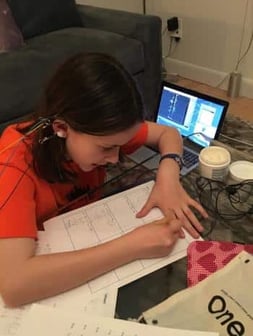When you live with a teenager, life can feel like a rollercoaster at times. But there is a difference between daily ups and downs and more serious signs that you don't want to ignore.
How do you tell the difference between normal teen stress and times when a parent needs to intervene? NYC therapist and neurofeedback trainer Alison Pepper, LCSW, explains the difference.
4 Signs your Teen is stressed-out
 1) Avoiding homework or studying
1) Avoiding homework or studying
Avoiding homework and studying is a good sign that school is becoming overwhelming. Some folks dive into stress head on but when the stress gets too high, we avoid and run away from responsibilities.
What to do: If you are noticing a shift in study habits or an avoidance of that big project or paper, check in with your teen and discuss what fears or stressors he or she might be feeling.
2) Highly fidgety or frustrated
If you notice your teen is having a harder time accomplishing school-related tasks or that she is becoming less organized or more easily frustrated, this might be a good sign they are stressed-out. When stress rises to intolerable levels, executive functioning becomes compromised. Because teens don't have as much life experience or perspective as the adults around, it can be helpful to notice these sign of stress and offer suggestions or support.
What to do: Sometimes a new planner can do the trick or time, or a parent can offer to take the weekend to work at a coffee shop together. Helping your teen acknowledge that they might be feeling more stress, normalizing that experience, and then offering tips that work for you could be just what your teen needs to hit the reset button.
3) Isolating more that usual
Every teen is different so trust your instinct. If you are reading this blog as a parent, teacher, coach, or friend, think about isolation as a spectrum. Some people are naturally on the introverted side of this spectrum and prefer to spend time alone. It's important to look for changes in behavior. Has your teen been spending more time alone at night and on the weekend? If so, for how long? Is she willing to talk about this or is she avoiding the topic altogether? It's important to give someone space but it's also important to communicate that you care and support your teen, even if she isn't willing to hear or acknowledge it yet.
What to do: If you think a teen you know is isolating more than usual, it's important to talk to other adults around, and increase his or her support network at home, at school, and in the community.

4) Struggling in classes with peers and teachers more than normal
If you are hearing from the school more than usual about concerns involving misbehavior in class, around work, or with peers, this is a big sign to check in with your teen. When stress starts showing up in their relationships with others it points to needing help finding coping strategies that are healthy. It's important to remember that most acting out at school reflects pain or overwhelming feelings that the teen is struggling with, not a desire to be self-destructive.
What to do: In situations like this, you want to open the lines of communication with the teen but also talk to school staff or other adults that might have insight into what is stressing the teen.
Start by communicating concern rather than anger, and openness rather than telling them that she is doing something wrong. Try using wording such as, "I'm concerned about what you're going through and I'd like to understand you. It seems like talking through where we can add support for you might be helpful."
Once you have identified that your teen is more stressed out than usual, then you need to think about what you can do from there. Doing what you usually do to destress as a family is always a good place to start. Asking for help at your child's school or from your trusted community is also an option.
WATCH VIDEO:
3 stress management tips For teens

1. Neurofeedback
Neurofeedback training for stress is an effective brain training method that teaches self-regulation and helps build resilience and flexibility. When we self-regulate, we are reducing stress. I recommend it for teens because unlike other stress management tools it does not require them to exert themselves other than to sit for 35 minutes. It's training the automatic functioning brain in order for teens to be able to shift and reset habitual patterns.
These patterns in teens manifest as an inability to focus, emotional outbursts, and not being able to find a centered state after periods of stress. Teens also show these habitual patterns through shutting down and not seeming to make an effort.
.png?width=495&name=why-neuroptimal-and-what-are-the-benefits-large-image-1%20(1).png)
At our New York office, we use the NeurOptimal® equipment. NeurOptimal® is an advanced brain training technology that has been evolving as computing power has improved for over 25 years. It is engineered by clinical psychologists in collaboration with scientists and mathematicians. This neurofeedback system is completely non-invasive technology that works by tracking the brain's electrical activity. The software then provides auditory feedback that triggers what is called the orienting response. This response regulates the brain’s ability to sense change in the environment and take in new information about what is different. One of the common immediate results of neurofeedback is a feeling of calm during and after the session.
ALSO READ
2. Mindfulness Meditation

Meditation for teens is another great way to support a stressed mind and body. It is a tool that helps teenagers be able to identify and work with their thoughts and feelings.
Meditation is beneficial during the teen years when they are developmentally trying to understand who they are as individuals. It creates a speed bump so they can become more familiar with themselves and understand and accept the ever-changing thoughts, emotions, and moods they experience.
Today, there are many meditation tools to help with managing stress. Your teen could watch a Youtube video or download an app like Buddhify or Headspace. Meditation can be done alone, with family members, or in a group setting. Click the link below if you want to read a bit more about introducing your child to mindfulness meditation.
ALSO READ

3. Exercise can be a very helpful tool when dealing with stress. Some kids get enough of it at school but many don't. A walk on a brisk day through the neighborhood could be a good place to start. Or encouraging them to play basketball in the park for a while.
Sign your teen up for that class they have been thinking about, especially if a friend can join them. It is a great way to get them committed to exercising.
If you as a parent go to gym, consider inviting your teen to join you there next time. There are programs at some health clubs that offer a lower-cost membership for teenagers. For example, at the Asphalt Green health club in Battery Park in New York, they have a group teen weight training program.
You know your child best and should think creatively about ways to engage him or her around exercise.
Teaching your teens through modeling stress management by your own actions is also a powerful way to communicate the importance of a healthy lifestyle. Don't be shy about finding creative approaches with your teen if he or she is resistant to more conventional supports. Remember: you can help your teen feel calm and centered and help her create healthy habits that can last her lifetime.